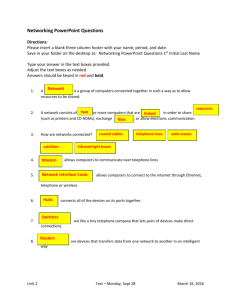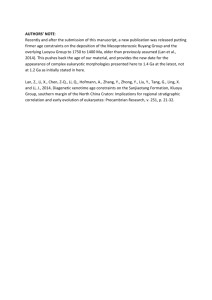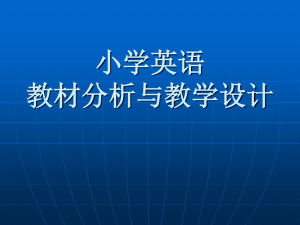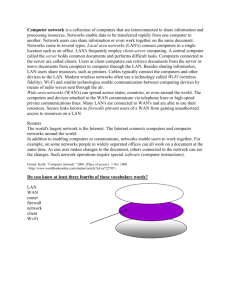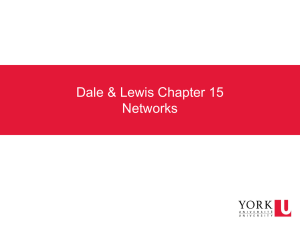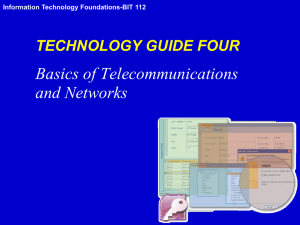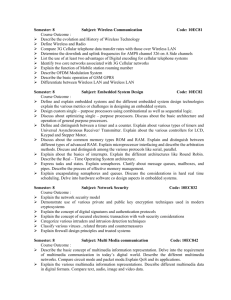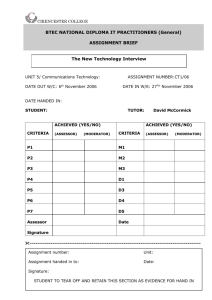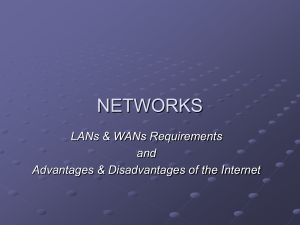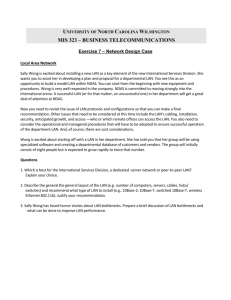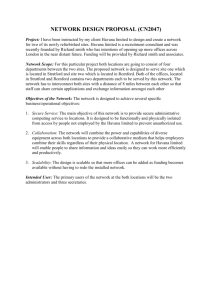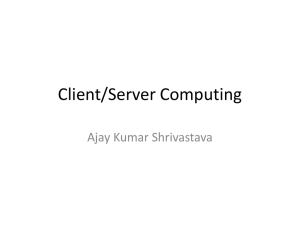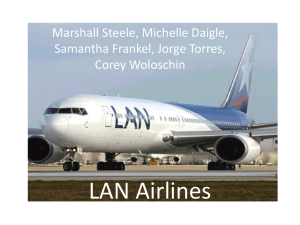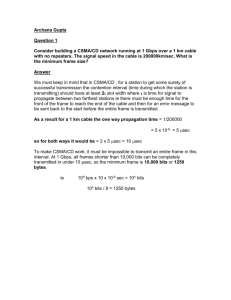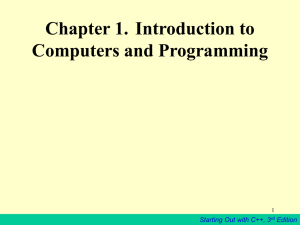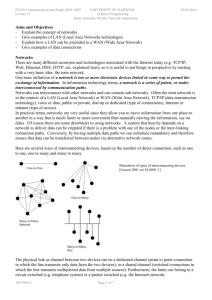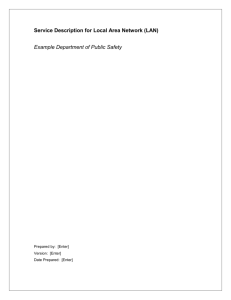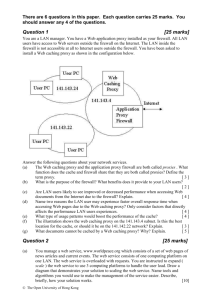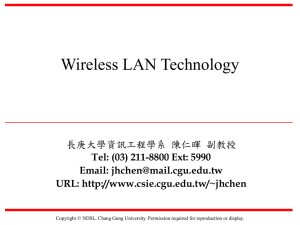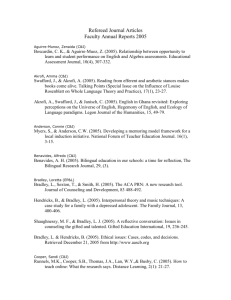MODULE 6 - The State University of Zanzibar
advertisement
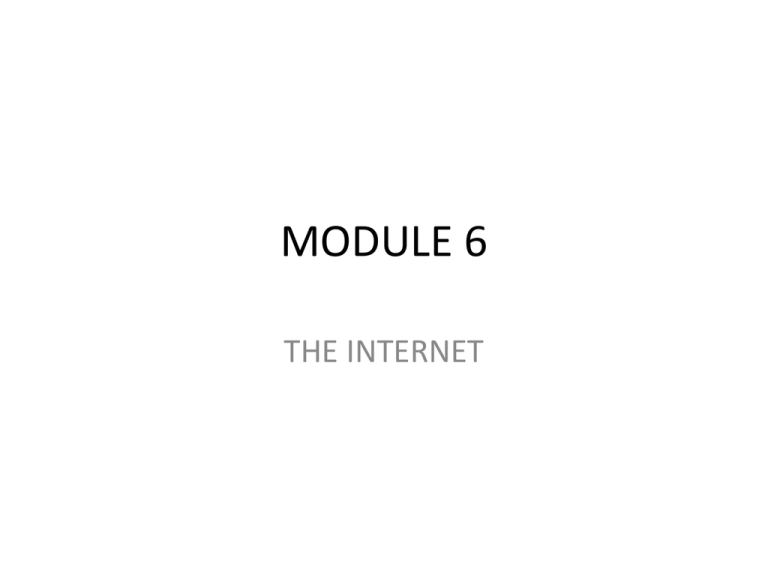
MODULE 6 THE INTERNET Introduction to the Internet and World Wide Web • A computer network is a communication system that connects two or more computers so that they can exchange information and share resources. • A network can be set up in different arrangement to suit users’ needs. Types of networks • Local Area Network • Metropolitan Area Network • Wide Area Network Local Area Network (LAN) • A local area network (LAN) is a network with nodes that are in close physical proximity— within the same building for instance. • Node—any device that is connected to a network. It could be a computer, printer, or data storage device. • Typically, LANs span distances less than a mile and are owned and operated by individual organizations. LAN Types of LANs • Home Networks is a LAN for home and apartment use; typically wireless. • Wireless LAN (WLAN) is a LAN where all communication passes through access point. • Personal Area Network is a LAN that connects digital devices such as PDAs. Metropolitan Area Network (MAN) • MAN spans distances up to 100 miles. • These networks are frequently used as link between office buildings that are located throughout a city. Wide Area Network (WAN) • Wide area networks (WANs) are countrywide and worldwide networks. • These networks provide access to regional services (MAN) providers and typically span distances greater than 100 miles. • They use microwave relays and satellites to reach users over long distances—for example, from Los Angeles to Paris. WAN The Internet • The Internet is the widest of all WANs, which spans the entire globe. • The Internet is often referred to as the Information Superhighway. • In a sense, it is like a highway that connects you to millions of other people and organization. • Unlike typical highways that move people and things from one location to another, the Internet moves your ideas and information. cont • The Web provides an easy-to-use, intuitive, multimedia interface to resources available on the Internet. • It has become an everyday tool for all of us to use. • The Internet was launched in 1969 when the United States funded a project that developed a national computer network called ARPANET. The Web • The Web provides an easy-to-use, intuitive, multimedia interface to resources available on the Internet. • The Web was introduced in 1991 at the CERN in Switzerland. • Prior to the Web, the Internet was all text―no graphics, animations, sound, or video. • The Web made it possible to include these elements. cont • The first generation of the Web, known as Web 1.0, focused on linking existing information. • In 2001, the second generation, Web 2.0, evolved to support more dynamic content creation and social interaction. • Facebook is one of the best known Web 2.0 applications. • Some suggest that we have entered into the next generation, Web 3,0. • It focuses on computer-generated information requiring less human interaction to locate and to integrate information. Uses of the Internet and the Web • • • • • Communicating Shopping Searching for information Education or e-learning Entertainment Accessing the Internet and the Web • The most common way to access the Internet is through an Internet Service Provider (ISP). • ISPs in Zanzibar are Zanlink, Zantel, Zanzibar Connect, Tigo, Airtel and Vodacom. • When provided with a connection to the Internet, you can use a browser program to search the Web. • Users connect to ISPs using one of a variety of connection technologies including DSL, cable, and wireless modem. cont • • • • • Browser URLs Domain name HTML Web page Browsers • Browsers are programs that provide access to Web resources. • This software connects you to remote computers, opens and transfer files, displays text, images, and multimedia, and provides in one tool an uncomplicated interface to the Internet and Web documents. • Four well-known browsers are Mozilla Firefox, Apple Safari, Microsoft Internet Explorer, and Google Chrome. URL • Uniform Resource Locator (ULR) is a web address of the resource. • http://www.suza.ac.tz • http represent the protocol used for Web traffic. • Protocols are rules for exchanging data between computers. • www.suza.ac.tz represents the domain name of the organization. cont • It indicates the specific address where the resource is located. • ac indicates an academic site. • tz indicates the site is in Tanzania. HTML • Web documents must be writing using the Hypertext Markup Language (HTML). • The browser interprets the HTML formatting instructions and displays the document as a Web Page. Electronic Mail • E-mail—provides a fast, efficient alternative to traditional mail by sending and receiving electronic documents. • E-mail is the transmission of electronic messages over the Internet. • Husein.Shaaban@suza.ac.tz • Web email for example yahoo.com, hotmail.com or google.com. Search Engines • Search engines are specialized programs that assist you in locating information on the Web and the Internet. • Example is Google’s search engine. Electronic Learning Tools Features Available in Student Registration System (Zalongwa)
